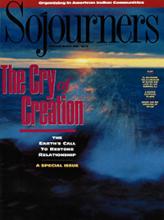The recent resurgence of concern about the environment has meant many good things for me, and one of them is that I'm starting to see some old friends again. Fifteen or 20 years ago, many of us were heeding the call to examine the causes behind all the hungry faces we saw in the news, as well as the industrial practices and lifestyle choices that were destroying our landscapes and filling our landfills. Even in the great political wasteland of the 1970s, we faced the challenge and even built friendships along the way.
But then we lost touch with each other. Some of us decided that "the real issues" were the structural injustices in our society -- sexism, racism, classism. We felt guilty protecting trees when children were dying from drugs and a lack of opportunities in inner cities. Others of us continued to work tirelessly to increase an awareness of just what the American lifestyle was doing to America. We'd all exchange Christmas cards and pleasantries, but both groups felt a little betrayed and lonely.
Now, however, we are starting to talk to each other again -- even about our concerns. The "issues" are coalescing, and so a homecoming or reunion of sorts seems to be possible. Most of us have realized that for honest healing to occur we must walk together. Environmental activism devoid of justice is naive and ineffectual, and justice-seeking work without concern for the earth is narrow and shortsighted.
Read the Full Article
